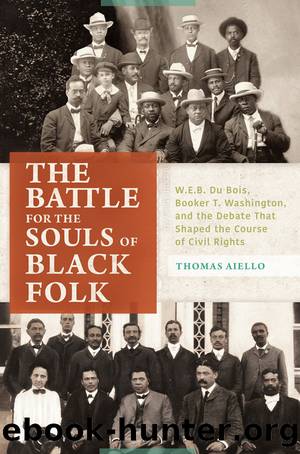The Battle for the Souls of Black Folk: W.E.B. Du Bois, Booker T. Washington, and the Debate That Shaped the Course of Civil Rights: W.E.B. Du Bois, Booker T. Washington, and the D by Thomas Aiello

Author:Thomas Aiello [Aiello, Thomas]
Language: eng
Format: epub
Tags: African American Studies, Civil Rights, Discrimination, Ethnic Studies, History, Law, Non-Fiction, Race Relations, Social Science
ISBN: 9781440843587
Google: U_EZDAAAQBAJ
Publisher: ABC-CLIO
Published: 2016-05-22T23:00:00+00:00
FRANCIS JACKSON GARRISON (Garrison was the son of abolitionist William Lloyd Garrison and Oswald Garrison Villard’s uncle.)
The Cedars, [Lexington, Mass.] April 9, 1905
Dear Oswald [Garrison Villard]: I return the Du Bois letter & documents herewith, after showing them to Uncle William, who sympathizes with my view of the matter as expressed in my hasty letter of Friday to you. I do not know that I have much to add to what I then wrote. It will take a great deal more than what Du Bois has written or presented to shake my faith in Washington’s purity of purpose & absolute freedom from selfishness & personal ambition. In spite of all the praise & honors & laudation that he is constantly receiving, I do not believe that he has any thought or purpose but the uplifting of his race, & I am sure that whatever he does is with that single object in view. Nor have I ever seen the slightest trace of personal jealousy, bitterness or resentment in him towards those who have been so despiteful towards him. His spirit & temper have been wonderfully calm & patient & enduring. Certainly the same cannot be said of Trotter & his sympathizers, & I cannot take any such stock in him as Du Bois does. I believe there is a vast deal of petty jealousy & spite in all this criticism of Washington, & I have never liked the bitterness betrayed by my friends the [Butler Roland] Wilsons, (Mrs. W. especially) & by Mrs. Bumstead, when B.T.W. was mentioned.45 Their spirit seemed to me far, far below his, & their “atmosphere” was as unpleasant as his was inspiring. Trotter’s behavior & speech at the mob meeting were that of a blackguard, & his purpose to wreck the meeting was deliberate.
Now as to the charges of subsidizing the negro press, the evidence offered by Du Bois is circumstantial & plausible, & I do not doubt that B.T.W. is doing all he can to influence the colored papers & secure unity rather than contention & discord, & this not because he cares for the attacks on himself, but because he knows that some of his assailants would gladly see Tuskegee wrecked if necessary to discredit & pull him down. He does show bad taste, or careless supervision of Scott, in allowing the latter to send fulsome praise of himself as syndicate matter. Theresa [Holmes Garrison] suggests that he may draw on his personal income ($7500) from the Carnegie gift for this press business.46
As for the men he influences, those mentioned by Du Bois are for the most part poor sticks, & like the mass of white politicians ready to sell their principles for an office or an income. I dare say Lewis would, though I have never heard before that B.T.W. had anything to do with his appointment, which was Roosevelt’s reply to the taunt that he made colored appointments at the South only, & R. of course knew Lewis through his Harvard athletic career, which was sufficient without any prompting from W.
Download
This site does not store any files on its server. We only index and link to content provided by other sites. Please contact the content providers to delete copyright contents if any and email us, we'll remove relevant links or contents immediately.
Becoming by Michelle Obama(10021)
Beartown by Fredrik Backman(5737)
The Last Black Unicorn by Tiffany Haddish(5630)
Man's Search for Meaning by Viktor Frankl(4586)
The Book of Joy by Dalai Lama(3976)
The Five People You Meet in Heaven by Mitch Albom(3562)
In a Sunburned Country by Bill Bryson(3537)
The Choice by Edith Eva Eger(3467)
Full Circle by Michael Palin(3443)
The Mamba Mentality by Kobe Bryant(3268)
The Social Psychology of Inequality by Unknown(3022)
Imagine Me by Tahereh Mafi(2942)
Book of Life by Deborah Harkness(2934)
The Checklist Manifesto by Atul Gawande(2849)
Less by Andrew Sean Greer(2689)
A Burst of Light by Audre Lorde(2597)
The Big Twitch by Sean Dooley(2431)
No Room for Small Dreams by Shimon Peres(2365)
Everest the Cruel Way by Joe Tasker(2339)
